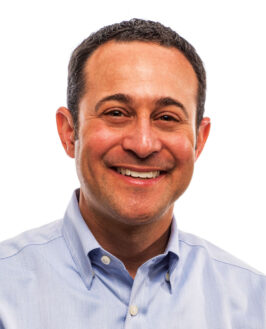
Hoang Tran, RN, checks a student’s temperature at Swigert Elementary School. All Denver Public Schools nurses are encouraged to monitor for measles symptoms. Front Porch photo by Christie Gosch

Dr. Noah Makovsky
For the first time in his 20-plus years as a pediatrician, Dr. Noah Makovsky, of Colorado Kids Pediatrics in Central Park, is actively assessing patients for measles. As of late April, four people in Colorado were diagnosed with measles, including a nine-month-old at Denver Health. “This is serious because the consequences can be so devastating,” Makovsky says.
From 2000 to 2024, the U.S. registered three deaths in total from measles. In contrast, between January and April of 2025, three measles-related deaths, and more than 700 cases of the disease, have been reported in the U.S.
Local MMR Vaccine Rates
“The good news is that in our area we have high rates of the MMR vaccine,” Makovsky says. MMR is the combined vaccine protecting against measles, mumps, and rubella. He continues, “That being said, some people have chosen not to vaccinate. That is always concerning.” According to the Colorado Department of Public Health and Environment (CDPHE), the 2024–25 MMR immunization rate for students in Denver County was 93.9 percent, with the kindergarten rate at 89 percent. Both numbers fell below the recommended MMR immunization threshold of 95 percent for herd immunity, or resistance to the spread of an infectious disease within a population.
Like Makovsky, Swigert International School nurse Hoang Tran has “not seen a measles situation like this before.” Denver Public Schools has encouraged health practitioners to monitor for measles symptoms such as fever, cough, congestion, spots in the mouth, and the tell-tale rash of red, flat spots. Explains Makovsky, “Unfortunately, the rash does not show up for three to four days into the illness, so the patient has been contagious for several days.”
Funding Cuts Add to Alarm
The U.S. government’s abrupt termination in March of four major public health preparedness and recovery grants to the (CDPHE) has brought additional turmoil to the health community’s concerns about infectious disease in Colorado. Although a federal judge has granted a temporary restraining order pausing the cuts, state programs on the line include vaccine clinics and immunization outreach on all vaccines, including MMR.
Additionally, should the U.S. government trim Medicaid as threatened by the current presidential administration, CDPHE predicts “lower immunization rates, increased disease outbreaks, wider health disparities, and a greater burden on the healthcare system,” says Hope Shuler, immunization communications manager.
Vaccination for Individual, Community Health
“Measles can be deadly in children, and many people end up hospitalized. They’re very sick. It can be quite frightening,” says Dr. Michelle Barron, professor of medicine and infectious diseases at the University of Colorado School of Medicine on the CU Anschutz Medical Campus. Complications from measles include pneumonia, blindness, swelling of the brain, and subacute sclerosing panencephalitis, a fatal nervous system infection.
While measles is a highly contagious disease, with 30 million cases occurring annually worldwide, the Centers for Disease Control and Prevention declared it “eliminated” in the United States in 2000. Until 1963, when the original measles vaccine was made available, about 500 Americans succumbed to the disease each year.
Makovsky, Tran, and Barron worry not only about a single patient contracting measles but also about the community as a whole. Makovsky notes, “There are people who can’t get vaccinated, people whose immune systems are compromised, for example, or babies who are too young to be vaccinated. We are taking care of these people when we are vaccinated.”
He adds, “I want people to know that (MMR) is a safe, proven, and very efficacious vaccine that prevents a lot of significant illness.” Makovsky, Tran, and Barron urge families to speak with a medical doctor to assess the benefits and risks of immunization.
Adults who were born after 1957 and vaccinated before 1968 should check with their doctors about whether they should get a booster.




0 Comments